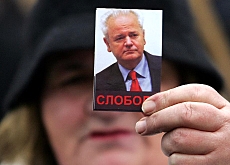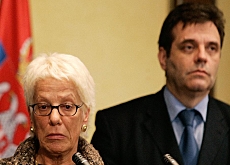Carla Del Ponte feels “total defeat”

The chief prosecutor of the United Nations war crimes tribunal, Carla Del Ponte of Switzerland, says the death of Slobodan Milosevic represents a personal defeat.
Del Ponte said the death of the former Yugoslav president on Saturday made the arrest of Bosnia Serb leader, Radovan Karadzic, and his military commander, Ratko Mladic, even more pressing.
In an interview with the Rome newspaper la Repubblica, del Ponte said she was enraged by the death, only months before the verdict was due in his four-year-old trial.
“I am furious,” she said in the interview. “In an instant everything was lost… The death of Milosevic represents for me a total defeat.
At a news conference in The Hague, where the tribunal is based, Del Ponte said on Sunday morning she could not rule out suicide. But first results from an autopsy released later in the day indicated he had died from a heart attack.
She noted that Milosevic’s death was the second within a week at the tribunal’s detention centre after the suicide of former rebel Croatian Serb leader Milan Babic.
Experts pointed out that the fact Milosevic died before being judged means he will remain forever “innocent” of all charges against him.
Heart condition
Milosevic, who suffered from a heart condition and high blood pressure, was found dead in cell on Saturday, only months before a verdict was due in his four-year-old trial.
He was charged with 66 counts of genocide, crimes against humanity and war crimes in indictments covering conflicts in Bosnia, Croatia and Kosovo as Yugoslavia imploded.
Medical checks of Milosevic, who was found dead in his cell, were thorough and should have picked up any worsening in his heart condition and high blood pressure, Del Ponte said.
“It is very strange, even if it is of course possible, that he should have died so suddenly without these medics having noticed a worsening of his condition.”
She refused to comment at the news conference on allegations by Milosevic’s lawyer that he may have been poisoned but told la Repubblica it would have been impossible.
Treated well
“In prison, Milosevic came to be considered and treated by all as a president, his old status was always recognised. Above all, there was much attention given to the preparation of his meals, there was no chance of unusual contacts.”
Relatives of war victims and Balkan politicians said they had been robbed of justice over conflicts that tore Yugoslavia apart in the 1990s.
“Now more than ever I expect Serbia to finally arrest and transfer Ratko Mladic and Radovan Karadzic to The Hague as soon as possible. The death of Slobodan Milosevic makes it even more urgent for them to face justice,” Del Ponte told journalists.
“I deeply regret the death of Slobodan Milosevic. It deprives the victims of the justice they need and deserve,” she added.
Milosevic’s lawyer, Zdenko Tomanovic, told reporters on Saturday his 64-year-old client had feared he was being poisoned but the tribunal rejected a request for the autopsy to take place in Russia.
swissinfo with agencies
Slobodan Milosevic was born in Pozarevac, Serbia, on August 20, 1941, son of a theologian.
His father and mother both committed suicide.
A communist functionary, he elbowed his way to the top of Yugoslav politics in the power vacuum left by the 1980 death of Yugoslav dictator Josip Broz Tito.
He was toppled on October 5, 2000, still resisting the result of a presidential election, when huge protests erupted in Belgrade.
Milosevic was arrested six months later and transferred in June 2001 to the United Nations war crimes tribunal in The Hague.
The International Criminal Tribunal for the Former Yugoslavia was established by Resolution 827 of the United Nations Security Council in May 1993.
Based in The Hague, it is the first international body for the prosecution of war crimes since the Nuremberg and Tokyo trials held after the Second World War.
The tribunal has jurisdiction over individuals responsible for genocide, war crimes and crimes against humanity in the territory of former Yugoslavia after Jan. 1, 1991.
Switzerland’s Carla Del Ponte is the tribunal’s chief prosecutor.
The tribunal may not try suspects in absentia, nor impose the death penalty. The maximum sentence is life imprisonment.
Two of the most wanted men by the tribunal are Radovan Karadzic and Ratko Mladic – the fugitive wartime leader of the Bosnian Serbs and his military chief.

In compliance with the JTI standards
More: SWI swissinfo.ch certified by the Journalism Trust Initiative



You can find an overview of ongoing debates with our journalists here. Please join us!
If you want to start a conversation about a topic raised in this article or want to report factual errors, email us at english@swissinfo.ch.